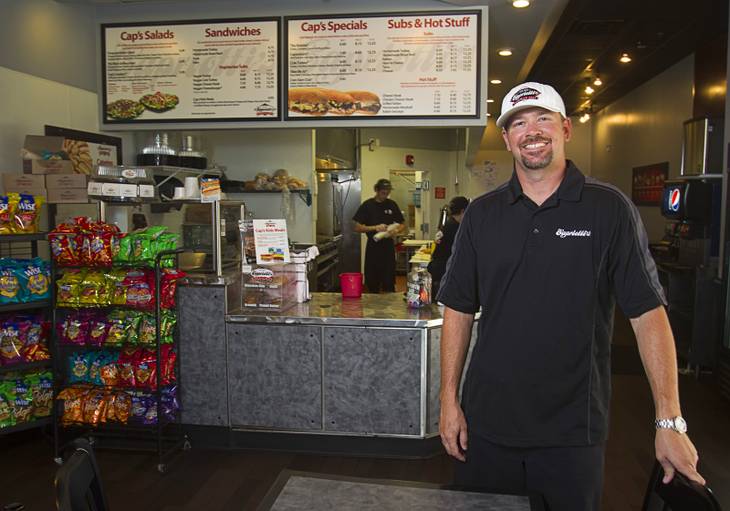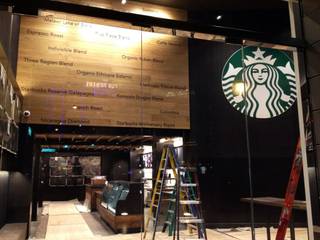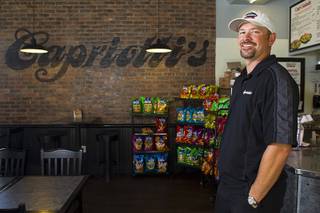Tom Gourley wouldn’t turn down a chance to open a Capriotti’s Sandwich Shop on the Strip, but he’s not fighting for the opportunity, either.
A successful franchisee who owns seven Capriotti's restaurants in Henderson, Las Vegas and Pahrump, Gourley says he sleeps better knowing he’s free from the control of major casino companies, whose oversight he compared to dictatorships.
Casino corporations own virtually all of the Strip’s eating and shopping areas and make it very difficult — if not impossible — for up-and-coming franchisees to gain a foothold in the heart of Las Vegas. In fact, they rarely get a chance to try.
“Everybody and his uncle would like to have a location for anything on the Strip," said Edward J. Smith, a salesman at First Choice Business Brokers. "In most cases, it's not achievable."
Why?
Because casinos like to bet on sure things — franchisees with deep pockets and a track record of success. Their favorite applicants are ones with a few million dollars in the bank and a number of thriving shops around the world.
Different management companies control the Strip’s shopping and dining spots — the Miracle Mile Shops at Planet Hollywood, the Grand Canal Shoppes at the Venetian, the Forum Shops at Caesars Palace — but their tactics are similar. The landlords have strict requirements for tenants.
At the Miracle Mile Shops, business owners have to provide an application, store renderings, product descriptions and full financial records just to get on a waiting list for potential vendors. No spots are guaranteed, and the line of people waiting for space is long.
With 145 shops, 15 restaurants and 675,000 square feet, the Forum Shops are a franchisee’s dream. The mall is anchored by mega retailers, including Apple, H&M and Nike, and its customer base includes more than 85 percent tourists.
But managers’ hard-nosed handling of lease applications turns many business owners away, Smith said.
It comes down to the bottom line. Without piles of money in the bank, getting an appointment is rare.
Strip landlords regularly ask for two or three months of rent as a security deposit. Others require "key money," a flat charge just to get in the door. Managers at the Polo Towers once required $25,000 in key money, Smith said.
Getting a franchised store can be a challenge in itself. McDonald's, for instance, which has more than 40 locations in Las Vegas, won’t consider any applicants with less than $750,000 of non-borrowed personal assets.
But franchises also offer a more secure business model. They are proven entities, typically with millions of marketing dollars behind them. Chances for success are far higher than startup companies.
Rents in the most popular retail centers on the Strip are astronomically high. A 1,000-square-foot shop, for example, could rent for as much as $13,000 a month.
"When most of the buyers find out what the rent is in any of these scenarios, they almost hang up on me," Smith said. "The average franchise buyer, no matter what he or she is buying, usually does not have the financial horsepower to measure up to what those people want."
And getting into a mall is no guarantee you’ll stay there.
At the Forum Shops, owners must produce a certain amount of gross income per month per square foot. If they fall short, management can pull their lease.
Most store owners don't have a problem making their numbers, but those who do have little time to recover.
The Forum Shops for years has been deemed the nation’s highest-grossing mall. Businesses regularly sell single items for tens of thousands of dollars daily.
Those sales are vital. Some landlords include language in leases that entitle them to a 10 percent royalty on sales of more than $500,000.
That's why mom-and-pop stores are practically unheard of on the Strip.
In the past, marginal franchises have secured spaces in major casinos, only to fall victim to disaster, Smith said.
"I've had grown men crying on the telephone to me, asking, 'Ed, what can I do?'” Smith said. “My advice to them is to call their lawyer and file for bankruptcy."
As CEO of First Choice Business Brokers, Jeffrey Nyman serves as the voice of reason for wide-eyed business owners who hope to unveil their products on the Strip.
“They have to have a couple million dollars to play," Nyman said.
"A lot of people think, 'All I need to do is find one thing that casinos will like, and I'll be set for life," said Nyman's wife, Linda Hentges-Nyman, First Choice’s corporate operations officer. "It doesn't always work that way."
"One guy said, 'I have hot dogs!'" Nyman added. "You're going to have to sell a lot of hot dogs."
Most retail landlords on the Strip won't even consider unproven franchises.
Off-Strip locations typically offer more security, if not more foot traffic. Whereas the Miracle Mile Shops draws about 82,000 visitors a day, the majority of them tourists, a Henderson or Las Vegas strip mall would be lucky to see a small portion of that in local traffic.
But while a single square foot of space might rent for $5 on the Strip, similar space in the suburbs might cost $2. A business owner looking to open a coffee shop might be able to rent 1,500 square feet of space at an Albertsons for $3,000.
Even so, securing a popular franchise anywhere can be challenging.
Opening an off-Strip Capriotti's costs an average of about $300,000, depending on size and location. Construction and equipment costs more.
In addition to rent and other expenses, Capriotti's franchisees also have to pay a franchise fee of $40,000 to cover marketing and training. The company requires all applicants to have a net worth of at least $1 million, with $500,000 in liquid assets.
"It's definitely tough for the little guy," Gourley said. "You need a lot of capital. I would hate to be somebody new in Las Vegas right now."
Franchisees in many cases also are responsible for finding potential locations for a business and pitching them to the company’s corporate office.
But good ideas can be quickly commandeered.
"If I got with a casino and I like it, I would go to Capriotti's and say, ‘I got a spot,’" Gourley said. "Corporate can then decide what they want to do with the property. They can hand it off to someone else."
Fair or not, that’s the way the system is set up.
“That’s their right,” Gourley said.


